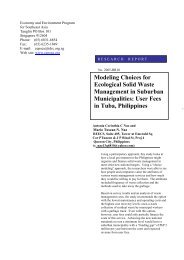systems research - the IDRC Digital Library - International ...
systems research - the IDRC Digital Library - International ...
systems research - the IDRC Digital Library - International ...
You also want an ePaper? Increase the reach of your titles
YUMPU automatically turns print PDFs into web optimized ePapers that Google loves.
From 1980 to 1986, <strong>the</strong> Integrated Rainfed Farming Research and Development<br />
project was funded and supported by <strong>the</strong> United Nation Development<br />
Programme (UNDP)/Food and Agriculture Ogranization (FAO) in cooperation<br />
with <strong>the</strong> Royal Thai Government. The <strong>research</strong> project, which was initially<br />
conceived by <strong>the</strong> Department of Agriculture, was later expanded as a joint<br />
venture between <strong>research</strong> and extension. The Farming Systems Research<br />
Institute (FSRI) of <strong>the</strong> Department of Agriculture \vas <strong>the</strong> main agency that<br />
conducted and coordinated this project. The Department of Agricultural<br />
Extension, <strong>the</strong> Department of Li\lestock, and <strong>the</strong> Office of Agricultural<br />
Economics joined <strong>the</strong> project as cooperating agencies.<br />
The goal of <strong>the</strong> project was to improve <strong>the</strong> productivity and income of<br />
farmers in selected rainfed areas of major agroecological zones. The project was<br />
to develop farming <strong>systems</strong> technologies, including alternative cropping sjTstems<br />
and crop-livestock integration; introduce <strong>the</strong>se technologies in different<br />
agroecological zones ot selected rainfed areas; test <strong>the</strong>se technologies in <strong>the</strong><br />
field; and train staff of <strong>the</strong> FSRI in interdisciplinary farming <strong>systems</strong> <strong>research</strong><br />
(FSR), development, and extension. The project coirered nine pro\.inces: five in<br />
<strong>the</strong> north (Phavao, Chiang R:ii, Lampang, Phrae, and Sukothai), tlio in <strong>the</strong><br />
nor<strong>the</strong>ast (~ahasarakam arid Surin), and t\iro in <strong>the</strong> south (Phattalung and<br />
Nakhon Sri Thaminar:it).<br />
Because <strong>the</strong> project \vas farmer-oriented, <strong>the</strong> strategy for implementation<br />
underwent several changes, i.e., from purely cropping <strong>systems</strong>, to crop-livestock<br />
integration, to a whole-farm approach. The strategy of <strong>the</strong> project included:<br />
defining <strong>the</strong> target areas according to agroecological and crop-production zones;<br />
analyzing <strong>the</strong> existing farming practices and socioeconomic profiles of <strong>the</strong><br />
representative farmers in <strong>the</strong> rainfed areas; packaging and testing <strong>the</strong> developed<br />
technologies and evaluating <strong>the</strong>ir technical feasibility and socioeconomic<br />
viability; and e.utending pro\.sn viable technologies to more farmers.<br />
Figure 1 shows <strong>the</strong> co~~ceptual frameivork of <strong>the</strong> project, which includes<br />
<strong>the</strong> stages of FSR, <strong>the</strong> agencies in~lolved, and <strong>the</strong> approsin~ate time and<br />
conditions required for creation, de\felopment, and transfer of <strong>the</strong> technology.<br />
Mature technology is agroecologically feasible, economically viable. socially<br />
acceptable, and ready for extension. The role of <strong>the</strong> FSR <strong>research</strong>ers decreases<br />
over time; whereas, <strong>the</strong> role of extension officers and farmers increases as <strong>the</strong><br />
stages of multilocation testing, pilot production, and production programs are<br />
reached. The farming and cropping technologies tested in <strong>the</strong> target farms were<br />
developed in <strong>research</strong> stations riot only in Thailand but also in o<strong>the</strong>r countries<br />
and international <strong>research</strong> csnters.<br />
The 15 applied <strong>research</strong> packages or technologies were chosen to fit <strong>the</strong><br />
agroclimatic, socioeconomic, and indigenous farming practices in <strong>the</strong> project<br />
sites. Five technologies were introduced in <strong>the</strong> different regions.
















